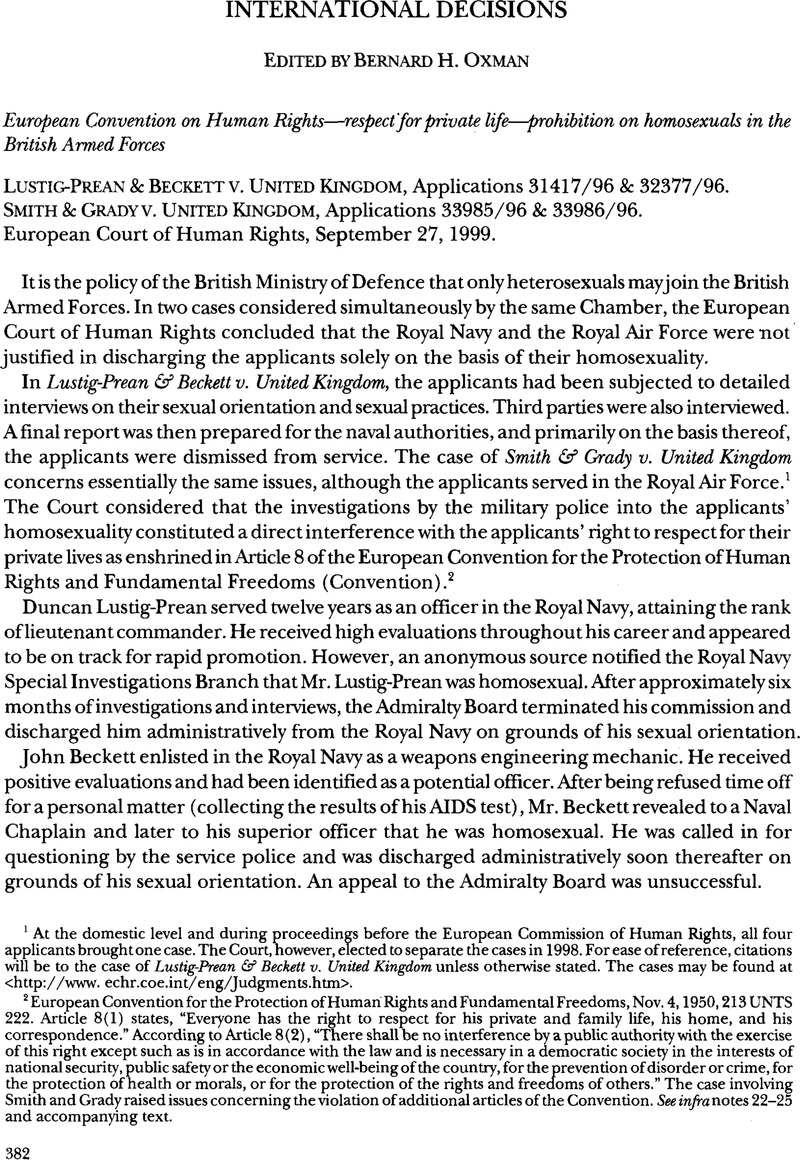Article contents
Lustig-Prean & Beckett v. United Kingdom; Smith & Grady v. United Kingdom
Published online by Cambridge University Press: 27 February 2017
Abstract

- Type
- International Decisions
- Information
- Copyright
- Copyright © American Society of International Law 2000
References
1 At the domestic level and during proceedings before the European Commission of Human Rights, all four applicants brought one case. The Court, however, elected to separate the cases in 1998. For ease of reference, citations will be to the case of Lustig-Prean & Beckett v. United Kingdom unless otherwise stated. The cases may be found at <>.
2 European Convention for the Protection of Human Rights and Fundamental Freedoms, Nov. 4, 1950, 213 UNTS 222. Article 8(1) states, “Everyone has the right to respect for his private and family life, his home, and his correspondence.” According to Article 8(2), “There shall be no interference by a public authority with the exercise of this right except such as is in accordance with the law and is necessary in a democratic society in the interests of national security, public safety or the economic well-being of the country, for the prevention of disorder or crime, for the protection of health or morals, or for the protection of the rights and freedoms of others.” The case involving Smith and Grady raised issues concerning the violation of additional articles of the Convention. See infra notes 22–25 and accompanying text.
3 Sexual Offences Act, 1967 (ch. 60).
4 Criminal Justice and Public Order Act, 1994 (ch. 33).
5 Id., sec. 146(4).
6 Regina v. Ministry of Defence, ex parte Smith, 4 All ER 427 (Q.B. 1995).
7 45 Eur. Ct. H.R. (ser. A) (1981).
8 See supra note 2.
9 302 Eur. Ct. H.R. (ser. A.) at 17 (1994).
10 See Leander v. Swed., 116 Eur. Ct. H.R. (ser. A) (1987).
11 The Government acknowledged that some of the detailed questioning of Mr. Beckett was excessive, but argued that overall the Convention had not been violated.
12 Norris v. Ir., 142 Eur. Ct. H.R. (ser. A) at 18 (1988).
13 Dudgeon v. U.K., supra note 7, at 21.
14 Id.
15 Smith & Grady v. U.K., para. 82.
16 Vereinigung Demokratischer Soldaten Österreichs and Gubi v. Aus., supra note 9, at 17.
17 Smith & Grady, paras. 83–86.
18 Id., paras. 88, 90.
19 Id., paras. 93, 98.
20 Id., paras. 104–05.
21 Supra note 10.
22 Claims under Article 10, both alone and in conjunction with Article 14, were dismissed. Smith & Grady v. U.K., paras. 124–28.
23 Id., para. 122. Note that in Tyrer v. U.K., 26 Eur. Ct. H.R. (ser. A), (1978), the Court held that it was sufficient if the victim was humiliated in his or her own eyes.
24 Smith & Grady, paras. 121–22.
25 See Regina v. Ministry of Defence, ex parte Smith, All ER 257 (C.A. 1996), aff’g supra note 6.
26 Smith & Grady v. U.K., paras. 138–39.
27 Human Rights Act, 1998 (ch. 42).
28 Dudgeon v. U.K., supra note 7.
29 Norris v. Ir., supra note 12; Modinos v. Cyprus, 259 Eur. Ct. H.R. (ser. A) (1993).
30 Hansard, Jan. 12, 2000, cols. 287–88, Palace of Westminster, Questions and Answers.
- 2
- Cited by




